
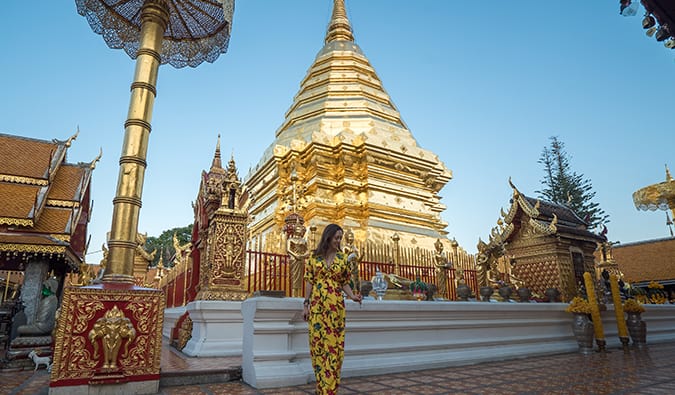
Posted: 1/2/2019 | January 2nd, 2019
1/2/2019 | January 2nd, 2019
Kristin Addis from Be My Travel Muse writes our regular column on solo female travel. It’s an important topic I can’t adequately cover, so I brought in an expert to share her advice for other women travelers to help cover the topics important and specific to them! In this month’s article, she shows you how she researches and plans her trips!
What’s the best way to go about researching your next trip when all of the decisions will fall to you as a solo traveler? Where should you go, what should you do, how will you navigate in your new surroundings? Where do you even begin to get answers to these questions?
Over the past six years, I’ve been mostly nomadic, traveling solo for the bulk of that time. Since I’ve been chief decision-maker for all of those trips, there are tricks I’ve learned along the way to help me save time in the long run, avoid spending too much and getting scammed, and make sure I know my way around before I even touch down.
The following is a step-by-step system to help you research your travel destinations. Most of these tips only take a few minutes but could save you big-time in terms of money, headaches, and confusion.
Ready to plan the solo trip of a lifetime? Let’s jump in!
1. Initial online research
I get a lot of my ideas from Instagram. I mostly follow travel accounts, and when I see a place that looks particularly beautiful, I use Instagram’s bookmark feature and put it in an album. I have one for Japan, one for New Zealand, and so on. When decide to travel to one of those destinations, I look back through my albums and consider if my budget, the time of year, and the activities I want to do there are all in alignment. (I suggest taking a look at Pinterest boards for those destinations as well.)

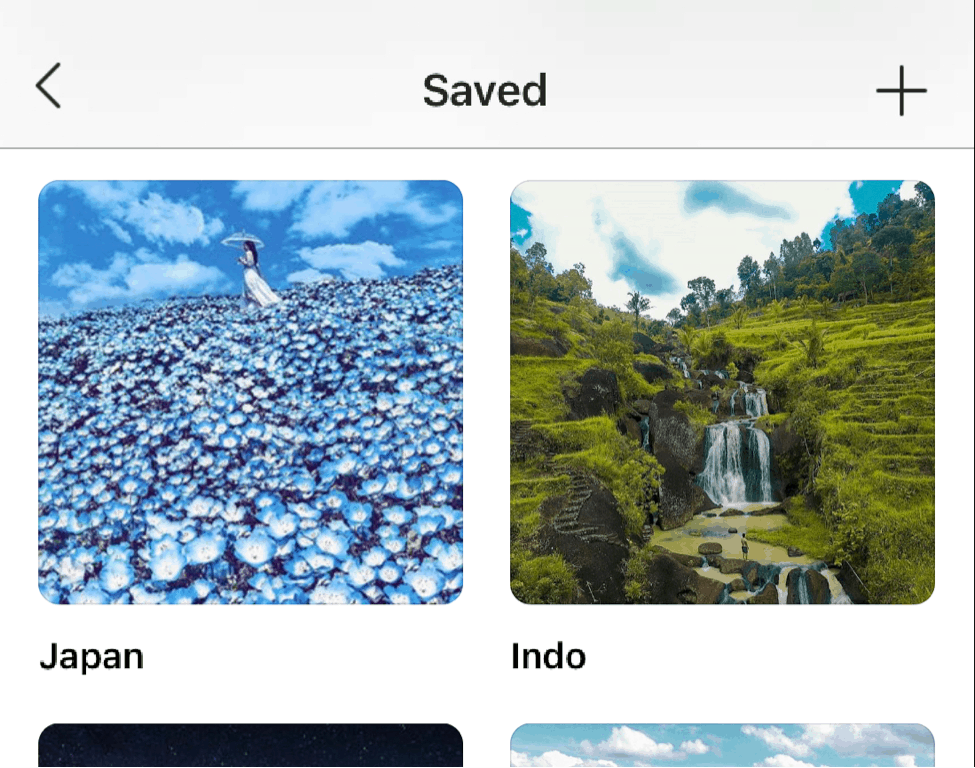
Chances are you already have a few destinations in mind and you just want to make sure that they will work for you. Evaluate the cost of traveling, think about the season it will be there, and make a decision based on those factors.
If you’re really not sure where to start, I have a list of some of the best countries for solo female travelers.
(I also take to heart word-of-mouth suggestions. It’s what led me to Mozambique and Patagonia. If someone I know has really loved a place, then I add it to the top of my list.)
2. Is the destination good for solo travelers?

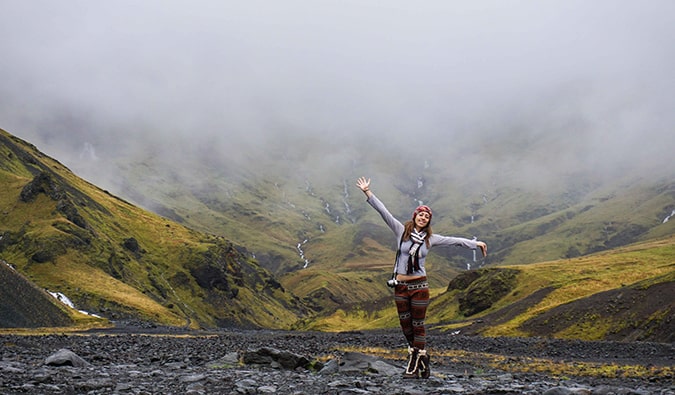
After six years of solo traveling, I’ve learned that the following criteria are almost guaranteed to produce a
- A well-known activity/draw: Is there a reason why people come to this place? Is it famous for surfing, rock climbing, scuba diving, or something else? When this is the case, you are much more likely to find other solo travelers participating in that experience.
- A festival: If there’s some kind of cultural event or festival at the time you’re visiting, you can bet that a lot of other travelers will be coming through as well, so you are unlikely to be lonely.
- Popularity: While I love off-the-beaten-path travel, I also know that the farther away from tourist centers I head, the more likely it is that I will spend more time alone. If I know I want to have a more social trip, I will head to places that are popular, like Thailand or Iceland. If you’re not sure where to start, this list has the most visited places in 2018.
After six years of solo traveling, I’ve learned that the following criteria are almost guaranteed to produce a more social experience for solo travelers
Next, I try to mitigate the possibility of being the only solo traveler there by researching whether I’m about to head to a honeymoon destination or hotel. That said, I had fantastic experiences in Maui and Bali, which are usually thought of as couples’ destinations. I believe that as long as you pick a social activity that attracts other solo travelers, like surfing or scuba diving, you won’t feel like the odd one out.
So if you want to go somewhere beachy, don’t rule it out automatically just because you’re afraid you’ll be the only single person there. Unless you’re going to a truly tiny place, chances are there are parts of whatever country or island you’re looking at that will be less “romantic” and more social.
The only place I can think of off the top of my head that might truly be primarily couples-only is the Maldives, and even then you can still head to other islands, or to surf resorts, or do a live-aboard dive experience, so that your trip will be less lounging on the beach and more about meeting people.
3. What is the visa situation?
Visas are the next thing I want to know about before I get too far into planning. Do I need a visa to visit this country? Is that something I need to apply for ahead of time? What does it cost?
Wouldn’t it be annoying to plan a trip to India or China only to realize you can’t get the visa in time? Wouldn’t it be better to get a longer visa ahead of time, like for Thailand or Indonesia, instead of having to do visa runs, which are required in many countries to extend a typical 30-day tourist visa, if you plan a longer trip?
I do visa research on Google and the US Department of State website and/or the foreign embassy website, and encourage you to do the same for your destination to see what the visa requirements are for you.
4. What is there to do there?


Now it’s time to figure out what I want to do there. In some cases, I already know, because I picked the place based on its good diving or great hiking. But in some cases, I really have no idea, other than it fits my budget, it’s the right time of year, or I just want to go somewhere warm.
Now it’s time to figure out what I want to do there. In some cases, I already know, because I picked the place based on its good diving or great hiking. But in some cases, I really have no idea, other than it fits my budget, it’s the right time of year, or I just want to go somewhere warm.
For example, I recently wanted to know what the best things to do in Tokyo were. So I just typed that exact question into Google, found some appealing options, and saved places in Google Maps with “want to go” flags for later.

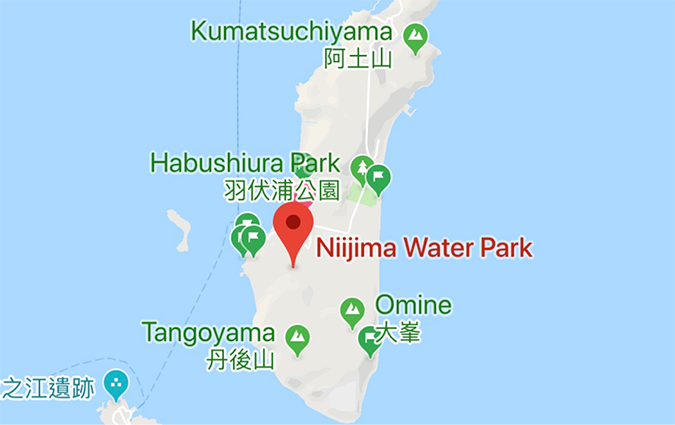
(In some cases, there’s not a lot of information online. That’s when you know you’ve found a true adventure, someplace there will not be that many other tourists. I love this kind of trip too, but you may have to make peace with the fact that you will be doing a lot of recon on the ground. This is the point at which I encourage you to ask yourself what your tolerance is for uncertainty and whether or not that’s what you desire out of your trip.)
5. Downloading offline maps
Now that I have put markers into Google Maps for the places I want to go, I make sure that I can access these without an Internet connection, just in case. I usually save Google maps offline; if I’m going to be hiking, I really like maps.me offline maps as well. It’s great to have both downloaded while you are still at home and have a strong internet connection, so that you know they’ll be accessible when you arrive.

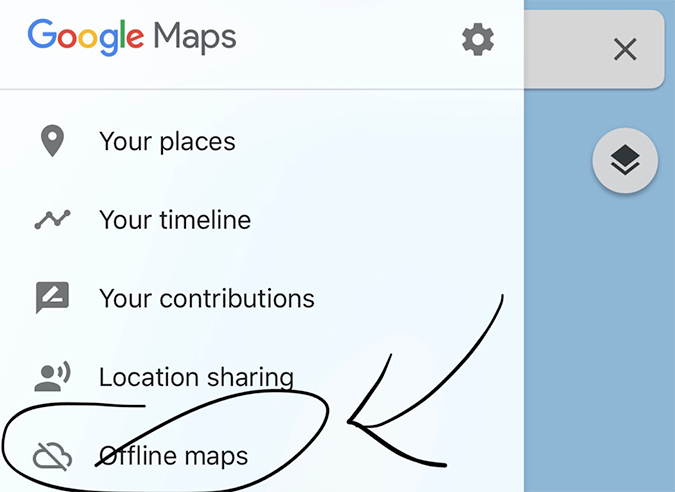
6. Booking the hotel
When it comes to accommodation, I almost always use either booking.com or Airbnb. I type in my destination and then I go directly to the map function. Which place has the best reviews at the best price and is going to be closest to the things I’m interested in seeing or doing? Or if I know I will be there only for a short while and will fly or take the train thereafter, which lodging is going to be the most convenient to catch that flight or train?

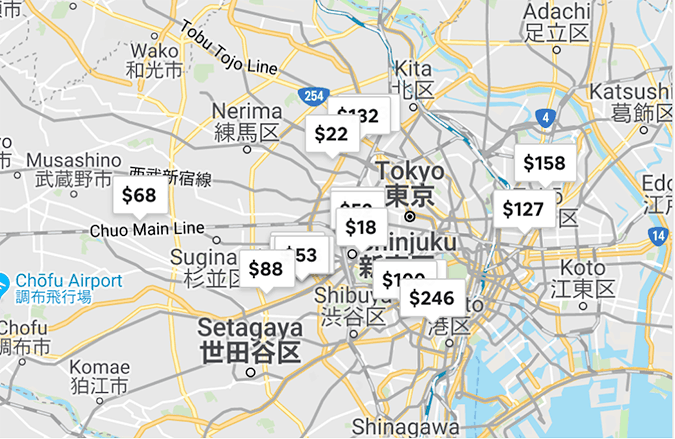
Generally, hostels will be more social than hotels, followed by Airbnb, unless you stay with a host who wants to show you around, which I wouldn’t count on. That said, you can look to couchsurfing if you want to be able to hang with your host – just read the reviews thoroughly first and be in full communication to make sure it’s a comfortable situation.
It also depends what part of the world you’re in. Bed-and-breakfasts might be quite social in South America, but a lot less so in Europe. I almost always read reviews to help me make my final decision.
I also don’t pressure myself to book a place for my entire stay. I want to be able to change my mind. Unless it’s high season (you can Google this too, but generally high season is when the weather is best) or there’s a holiday that I know is going to make it hard for me to move, I will just book a few days and then decide to move on or stay.
7. Research the best way to get to the hotel
Next I weigh my transportation options. Does the country I’m going to have Uber? Is it better to take the train? Is there an airport hotel shuttle, or bus from the airport to my hotel? In many cases, the hotel will provide this information in their correspondence with you or on their website. If it’s not listed, feel free to contact them and ask.
I also find TripAdvisor, Lonely Planet Thorntree, and Nomadic Matt’s forums are helpful because people are always asking this exact same question.
8. Research scams and dangers
Unfortunately, airports are the epicenter of tourist scams in many countries. The Denpasar airport in Bali, Indonesia, is one of the worst. In order to get out without getting scammed, you would need to know that the SIM card they are selling is marked up about 10 times what it would be once you leave the airport. You would also need to know that they do the same thing with taxi prices. (As a general rule, get the names of reputable companies before you go, never get in an unmarked taxi, and always know what the price of your ride should be before you get in. Google will help you with all of this.) And you would need to be aware that you can book an Uber for much cheaper if you meet the car at the departures level and ignore everyone who tries to tell you Uber “isn’t allowed” there.
When I fly into Bali, I just walk right through the mayhem with my head held high, because I have already done my research.
To get this info, I Google the airport name along with the word “scam” to see what other travelers have experienced, and then I know to be prepared when I get there. This removes so much stress when arriving in a new country.
9. SIM cards
I also research what a SIM card should cost, whether the airport is a good place to get it or not, and which company is the best. Again, Google and online forums are usually pretty helpful with this information.
I always travel with an unlocked phone so that I can get local SIMs. They are the cheapest method for staying connected, sometimes just a few dollars per gigabyte, and it simplifies getting to the hotel by allowing me to book an Uber immediately. Most of the time, it makes sense to buy a SIM card at the airport if you can, although sometimes, like in the aforementioned case of Bali, it’s much better to wait until you get to town. If you research this beforehand, you’ll already know.
It’s worth mentioning that you cannot count on there being reliable airport Wi-Fi. So try not to leave your taxi or SIM card research until you’ve already landed, because then it could be too late.
10. Final step: See if you already know anyone there

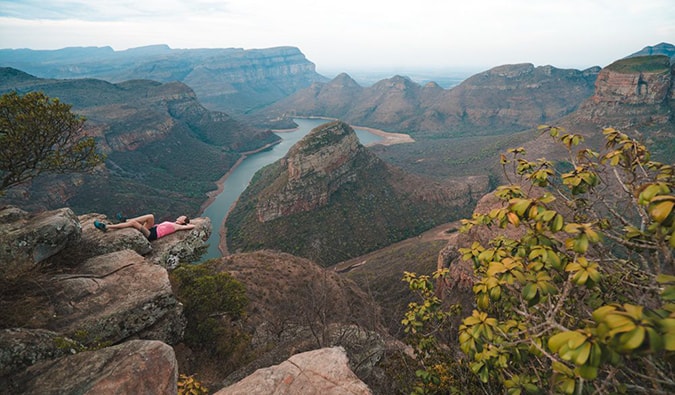
Finally, I sometimes post on my personal Facebook page
Finally, I sometimes post on my personal Facebook page to see if I have any connections at my destination . In the case of South Africa a few years ago, I met up with a friend of a friend, which was the impetus for one of the most friendly and social traveling experiences I’ve had. You never know who you might know and where.
You can also look into Couchsurfing, even if it’s just for a social event rather than actually staying with the person. There are also plenty of Facebook groups these days for connecting with others. Some are regional, like Backpacking Africa, or you can join one specifically for solo female travelers, like the BMTM Solo Female Traveler Connect.
Though I didn’t always know to do all of this research prior to my trips, after a few blunders, I’m glad to have finally learned what’s important to know ahead of time. Though it might seem like a lot of research, these tips can help you avoid overspending and to have a more relaxed and easy trip.
What are some of your favorite ways to research before you travel solo?
Conquering Mountains: The Guide to Solo Female Travel

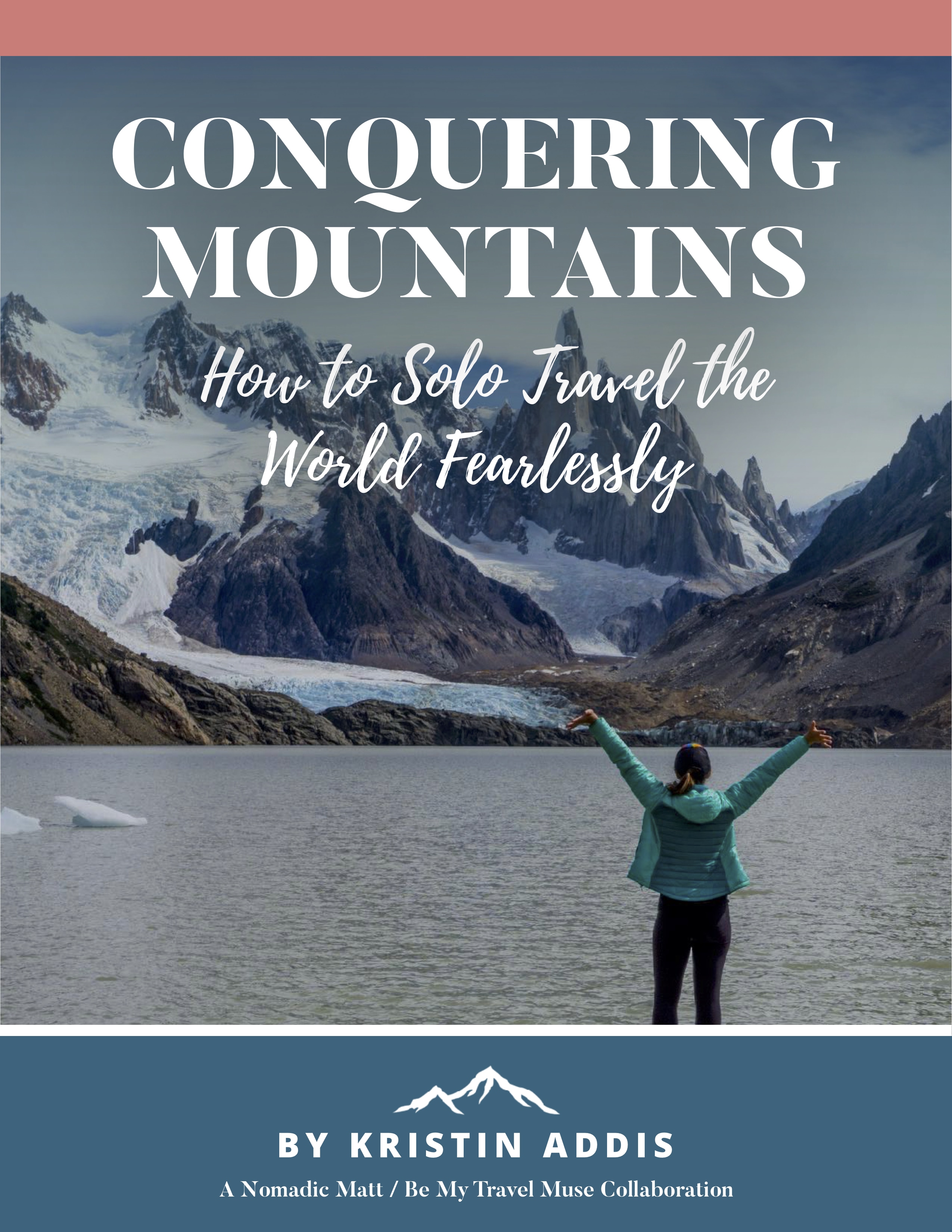 For a complete A-to-Z guide on solo female travel, check out Kristin’s new book, Conquering Mountains. Besides discussing many of the practical tips of preparing and planning your trip, the book addresses the fears, safety, and emotional concerns women have about traveling alone. It features over 20 interviews with other female travel writers and travelers. Click here to learn more about the book and start reading it today!
For a complete A-to-Z guide on solo female travel, check out Kristin’s new book, Conquering Mountains. Besides discussing many of the practical tips of preparing and planning your trip, the book addresses the fears, safety, and emotional concerns women have about traveling alone. It features over 20 interviews with other female travel writers and travelers. Click here to learn more about the book and start reading it today!
Kristin Addis is a solo female travel expert who inspires women to travel the world in an authentic and adventurous way. A former investment banker who sold all of her belongings and left California in 2012, Kristin has solo traveled the world for over four years, covering every continent (except for Antarctica, but it’s on her list). There’s almost nothing she won’t try and almost nowhere she won’t explore. You can find more of her musings at Be My Travel Muse or on Instagram and Facebook.
Book Your Trip: Logistical Tips and Tricks
Book Your Flight
Find a cheap flight by using Skyscanner or Momondo. They are my two favorite search engines because they search websites and airlines around the globe so you always know no stone is left unturned.
Book Your Accommodation
You can book your hostel with Hostelworld as they have the largest inventory. If you want to stay somewher eother than a hotel, use Booking.com as they consistently return the cheapest rates for guesthouses and cheap hotels. I use them all the time.
Don’t Forget Travel Insurance
Travel insurance will protect you against illness, injury, theft, and cancellations. It’s comprehensive protection in case anything goes wrong. I never go on a trip without it as I’ve had to use it many times in the past. I’ve been using World Nomads for ten years. My favorite companies that offer the best service and value are:
- World Nomads (for everyone below 70)
- Insure My Trip (for those over 70)
Looking for the best companies to save money with?
Check out my resource page for the best companies to use when you travel! I list all the ones I use to save money when I travel – and I think will help you too!
没有评论:
发表评论